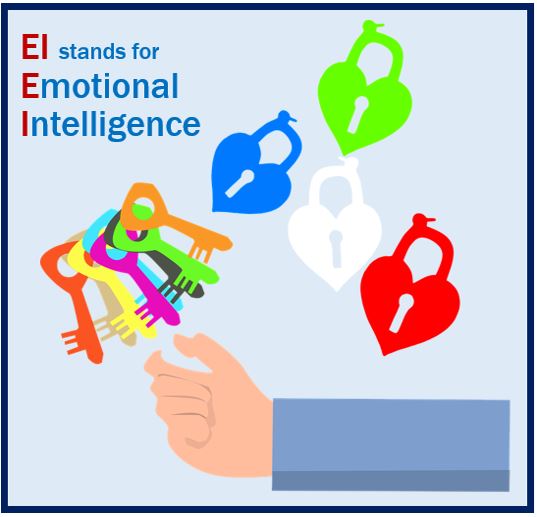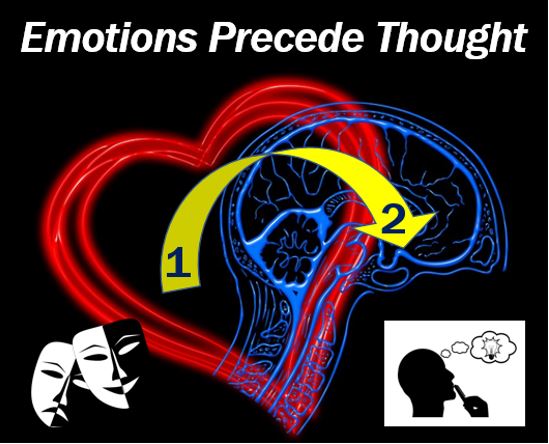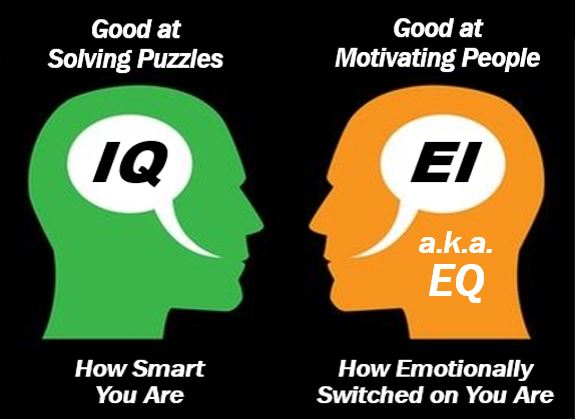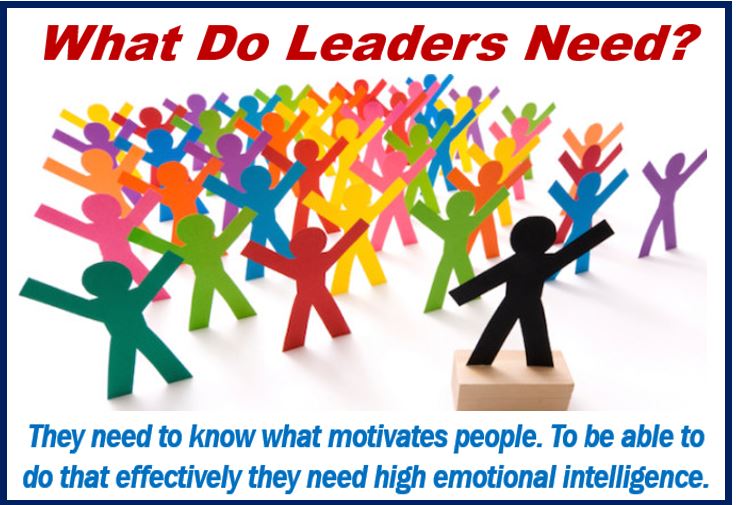What is emotional intelligence? Definition and examples
Emotional Intelligence is our ability to perceive, understand, use, manage, and handle human emotions. If you have high emotional intelligence, you are able to recognize your own emotions as well as those of other people.
You can also influence other people’s emotions if you have high emotional intelligence. We can use the acronym EI with the same meaning.

“Emotional intelligence or EI is the ability to understand and manage your own emotions, and those of the people around you. People with a high degree of emotional intelligence know what they’re feeling, what their emotions mean, and how these emotions can affect other people.”
People with high emotional intelligence
Someone with high EI knows that emotions can drive human behavior. If you are aware of how emotions can impact people either positively or negatively, you possess EI, especially if you know how to manage those emotions in yourself and others.

As emotions precede thought, having high emotional intelligence is definitely a major asset.
The five components of EI
PsychCentral identifies five components of emotional intelligence:
1. Self-regulation
If you are able to self-regulate, i.e., control yourself, your emotional responses are in proportion to triggers or situations. You can control your impulses, pause when you have to, and ‘look before you leap’.
2. Empathy
You can appreciate people’s emotions, i.e., understand what they are feeling. You can ‘walk around in their skin.’ People with low levels of empathy do not have high emotional intelligence.
3. Motivation
Naturally motivated people strive for personal development. They are driven to succeed and reach specific goals. Outside rewards such as status, fame, or money matter less than personal development.
Advanced emotional intelligence also enhances one’s adaptability in the face of change, equipping individuals with the resilience to manage and thrive amidst the evolving dynamics of both personal and professional environments.
4. Social skills
You are a good team member. In conversations and conflict resolution, you are aware of other people and what their specific needs are. You know how to listen and build relationships or rapport with people.
Furthermore, emotional intelligence plays a significant role in conflict resolution, as it allows individuals to navigate disagreements with empathy, often leading to more constructive outcomes.
5. Self-awareness
You know what your feelings are, as well as your motives and behaviors. You are acutely aware of how your own emotions can affect people around you. You also understand why your emotions form part of who you are. You know what your strengths and weaknesses are. Self-aware people are humble individuals.
Difference between IQ and EI
People often confuse the two terms or use them interchangeably. They are quite different.

-
IQ or intelligence quotient
IQ stands for Intelligence Quotient. IQ measures people’s intelligence, i.e., their brainpower. To find out what your IQ is, you undergo several standardized tests.
-
EI or emotional intelligence
Emotional intelligence has nothing to do with how good you are at solving puzzles.
It is all about empathy and your ability to perceive, use, control, and manage your and other people’s emotions.
Which matters more in the workplace, IQ or EI?

-
Emotional intelligence
It depends on your kind of work. If you are involved in teamwork, motivating people, sales, training, etc., emotional intelligence is crucial.
For leadership, possessing high emotional intelligence is crucial for success. You need to know how to behave when under stress or very elated. You must also be good at sensing stress, anxiety, euphoria, or fear in other people, and how to treat or motivate them.
Dale Carnegie (1988-1955), an American developer of courses in salesmanship, self-improvement, public speaking, and corporate training, once said:
“When dealing with people, remember you are not dealing with creatures of logic, but with creatures of emotion.”
Several studies have shown that high EI individuals have better mental health than their counterparts with lower levels of emotional intelligence. They also have superior leadership skills and job performance.
-
Intelligence quotient
Which jobs or careers have people with high IQs? According to enhancingbrain.com, there are several professions that highly intelligent people choose, such as computer-related occupations, science, engineering, university professorships, and medicine.
You would not be able to work as a top rocket scientist or roboticist without a high IQ.
A relatively new term
The term ‘emotional intelligence’ has been around since 1990, when two researchers, Peter Salovey and John D. Mayer wrote an article titled “Emotional Intelligence.”
According to Salovey and Mayer:
“(Emotional intelligence is) a form of social intelligence that involves the ability to monitor one’s own and others’ feelings and emotions, to discriminate among them, and to use this information to guide one’s thinking and actions.”
However, the concept did not gain widespread popularity until 1995 with the publication of psychologist and author Daniel Goleman’s book “Emotional Intelligence: Why It Can Matter More Than IQ.”
Compound phrases with “emotional intelligence”
A compound phrase is a term consisting of two or more words. “Emotional intelligence” is a compound phrase. Here are some 3-word compound phrases containing the term “emotional intelligence.”
-
Emotional Intelligence Quotient
Often abbreviated as EQ, this phrase refers to the measure of a person’s emotional intelligence.
For example: “During the interview process, the company considered the candidate’s Emotional Intelligence Quotient as important as their technical abilities.”
-
Emotional Intelligence Training
Programs or workshops designed to improve a person’s ability to understand and manage emotions.
For example: “The HR department has implemented ‘Emotional Intelligence Training’ to help team leaders better connect with their staff.”
-
Emotional Intelligence Assessment
A tool or method used to evaluate an individual’s emotional intelligence skills.
For example: “Before promoting employees to managerial positions, our organization requires them to complete an ‘Emotional Intelligence Assessment.'”
-
Emotional Intelligence Scale
A psychometric scale used for assessing emotional intelligence.
For example: “The psychologist used an ‘Emotional Intelligence Scale’ to determine the best candidates for the leadership program.”
2 Videos
These two interesting educational videos, from our sister YouTube channel – Marketing Business Network, explain what ‘Emotional Intelligence (EI)’ and ‘Intelligence Quotient (IQ)’ are using simple, straightforward, and easy-to-understand language and examples.
-
What is Emotional Intelligence (EI)?
-
What is Intelligence Quotient (IQ)?

